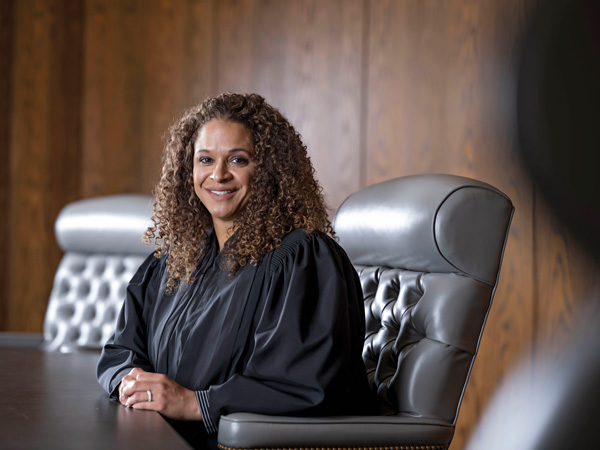Jayhawk Judges: Hon. Jacy Hurst, L’07

For Jacy Hurst, becoming a judge was a childhood dream.
She remembers taking a field trip with her sixth-grade class, where students took on roles designed to teach them about economics, civics and financial transactions. Hurst’s role: judge.
“I was the judge of our city that day, and ruled with an iron fist, as I recall,” Hurst said.
It was an idea that would stay in the back of her mind through college, law school and the first part of her legal career. And it was a path she would come back to after years of litigation practice. Gov. Laura Kelly appointed Hurst to the Kansas Court of Appeals in February 2021. She was sworn in as a judge in August, after being confirmed by the Kansas Senate in March.
‘Here for everyone’
Originally from Lawrence, Hurst earned her undergraduate degree from the University of Kansas, where she studied business administration and political science. When it was time to choose a law school, KU Law was the natural and best choice, Hurst said.
After graduation, Hurst set about building a broad, deep legal background. Prior to her appointment on the Court of Appeals, Hurst was a partner with the national law firm Kutak Rock, LLP, specializing in health care regulatory and employment law. She previously was general counsel and chief compliance officer for Swope Health Services from 2014-2017, and an associate attorney focusing on business litigation with Stinson LLP from 2007-2014.
When Gov. Kelly nominated Hurst to the Court of Appeals, the prospect of going through Kansas’ “robust, extensive merit-based selection system” was daunting, Hurst said.
“I feel honored to have accepted the nomination and achieved the confirmation,” Hurst said.
As an intermediate court, the Court of Appeals is charged with analyzing existing evidence in cases to make sure it meets the standard set forth by the Kansas Supreme Court. Hurst said she enjoys engaging in analysis and dialogue about cases with her colleagues.
“There’s really nothing better than deeply reviewing a question and engaging in that thoughtful debate,” Hurst said.
With no prescribed outcome for each case, it’s possible that neither side will be pleased with the court’s ruling. Rather than aiming for a certain result, the court’s role is to ensure accurate legal interpretation and application, Hurst said.
“I want to work with my colleagues on the court to lend my unique perspective, analysis and experience to resolve, or at least further, matters affecting Kansans, so as to assure there’s equal access to and application of the rules of law. We’re here for everyone,” she said.
Pursuing goals
A lifelong Kansas resident, Hurst feels a true connection and commitment to the state, she said.
“I feel rejuvenated by the energy of Kansas,” Hurst said. “Our history includes a lot of trailblazing and innovation, but we’re still really grounded in logic and reason. Kansans are definitely not a monolith, and we can’t be neatly pushed into uniformity, and I love that.”
During the first part of her career, Hurst’s judicial goals in some ways felt further away than they did when she was young, she said.
“You start on a path, and you make progressions on that path, and diverging from that path carries risk and uncertainty and fear that you didn’t have as a child,” she said.
When Hurst considered pursuing a judgeship, she remembered the advice she had given her children, “telling them they could do anything they wanted to do, and then thinking to myself, ‘Why don’t you apply that standard to yourself?’” she said.
Hurst also credits her mentors for encouraging her to pursue the goal she imagined as a child.
“I had the opportunity to know some amazing judges who I saw as terrific mentors and who led me back to this childhood path,” Hurst said.
Hurst encourages law students to find a mentor who can help them understand the potential routes toward their goals. The path doesn’t have to be traditional, she said.
“Letting fear keep you from that is an option, but it doesn’t have to be the option,” Hurst said.
“You don’t have to let other people’s opinions or your own perceptions of limitations to that goal stop you from achieving it.”
This article appeared in print in the 2021 KU Law Magazine.
Photo by Earl Richardson, L'08